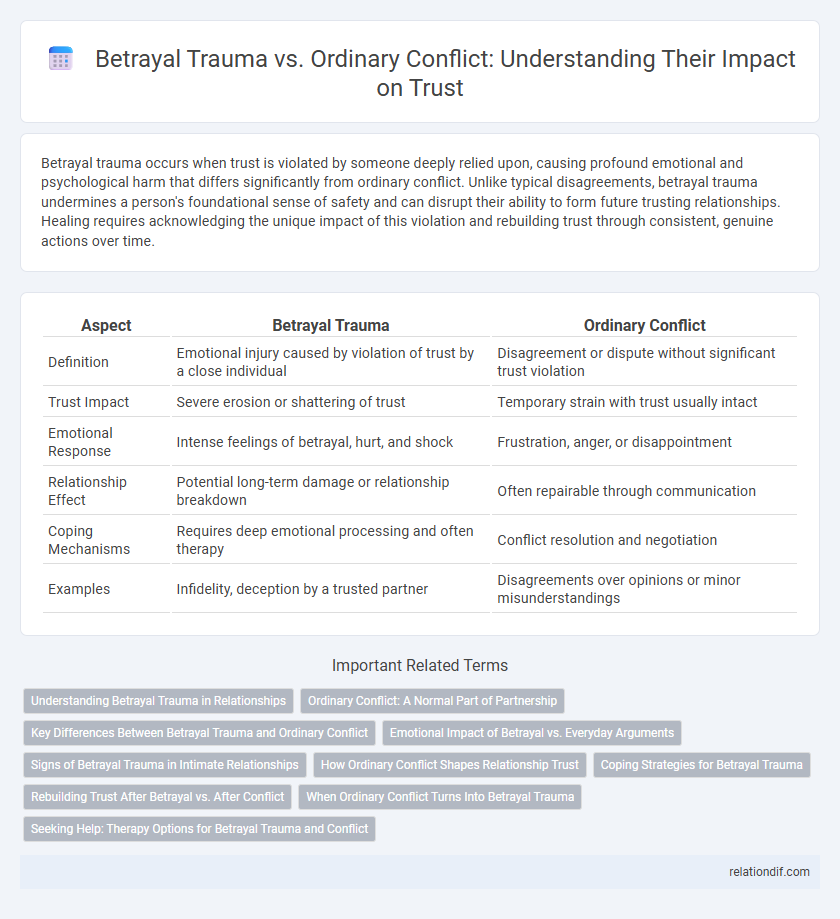Betrayal trauma occurs when trust is violated by someone deeply relied upon, causing profound emotional and psychological harm that differs significantly from ordinary conflict. Unlike typical disagreements, betrayal trauma undermines a person's foundational sense of safety and can disrupt their ability to form future trusting relationships. Healing requires acknowledging the unique impact of this violation and rebuilding trust through consistent, genuine actions over time.
Table of Comparison
| Aspect | Betrayal Trauma | Ordinary Conflict |
|---|---|---|
| Definition | Emotional injury caused by violation of trust by a close individual | Disagreement or dispute without significant trust violation |
| Trust Impact | Severe erosion or shattering of trust | Temporary strain with trust usually intact |
| Emotional Response | Intense feelings of betrayal, hurt, and shock | Frustration, anger, or disappointment |
| Relationship Effect | Potential long-term damage or relationship breakdown | Often repairable through communication |
| Coping Mechanisms | Requires deep emotional processing and often therapy | Conflict resolution and negotiation |
| Examples | Infidelity, deception by a trusted partner | Disagreements over opinions or minor misunderstandings |
Understanding Betrayal Trauma in Relationships
Betrayal trauma in relationships involves a profound breach of trust when a partner's actions violate core expectations, leading to intense psychological distress distinct from ordinary conflicts. Unlike typical disagreements, betrayal trauma disrupts the foundational sense of security, causing victims to question their reality and relationship stability. Understanding betrayal trauma requires recognizing its impact on emotional regulation, attachment patterns, and long-term healing processes to rebuild trust effectively.
Ordinary Conflict: A Normal Part of Partnership
Ordinary conflict in partnerships involves disagreements that arise naturally from differing perspectives and needs, fostering growth when managed constructively. Unlike betrayal trauma, which deeply wounds trust through violations such as infidelity or deceit, everyday conflicts provide opportunities for communication and resolution without lasting emotional harm. Effective conflict resolution strengthens relational trust by encouraging empathy, understanding, and mutual respect.
Key Differences Between Betrayal Trauma and Ordinary Conflict
Betrayal trauma involves a profound violation of trust by a close or significant person, leading to intense psychological distress and potential long-term emotional scars, whereas ordinary conflict typically arises from misunderstandings or disagreements without necessarily damaging the foundational trust. Key differences include the depth of emotional impact, with betrayal trauma often causing feelings of abandonment, shock, and confusion, while ordinary conflict tends to result in transient frustration or anger. Neurobiological effects in betrayal trauma can disrupt cognitive and emotional processing, unlike typical conflicts which usually allow for quicker recovery and resolution.
Emotional Impact of Betrayal vs. Everyday Arguments
Betrayal trauma results in profound emotional scars that deeply disrupt trust and create lasting psychological wounds, unlike ordinary conflicts which typically cause temporary tension and can be resolved through communication. The emotional impact of betrayal involves feelings of intense hurt, disbelief, and a fractured sense of security, often leading to complex trauma responses such as anxiety, depression, and difficulty in future relationships. Everyday arguments, by contrast, usually involve less severe emotional upheaval and allow for reconciliation and mutual understanding without fundamentally damaging the relational foundation.
Signs of Betrayal Trauma in Intimate Relationships
Signs of betrayal trauma in intimate relationships include intense emotional distress, difficulty trusting the partner, and persistent feelings of betrayal even after reconciliation attempts. Victims may experience symptoms such as anxiety, depression, dissociation, and hypervigilance that surpass typical conflict reactions. These markers differentiate betrayal trauma from ordinary relationship conflicts by highlighting the profound breach of trust and its psychological impact.
How Ordinary Conflict Shapes Relationship Trust
Ordinary conflict in relationships typically involves misunderstandings or differences in opinions that, when resolved constructively, can strengthen trust by fostering open communication and mutual respect. Unlike betrayal trauma, which deeply damages trust due to violations of core expectations, ordinary conflicts offer opportunities for partners to demonstrate reliability and empathy. Effective resolution of everyday disagreements reinforces trust by building a foundation of accountability and emotional safety.
Coping Strategies for Betrayal Trauma
Betrayal trauma requires specialized coping strategies distinct from ordinary conflict due to its deep impact on trust and emotional stability. Effective approaches include seeking trauma-informed therapy, building a supportive social network, and practicing self-compassion to restore a sense of safety. Developing mindfulness techniques and setting clear boundaries further aids in managing symptoms and rebuilding resilience after betrayal.
Rebuilding Trust After Betrayal vs. After Conflict
Rebuilding trust after betrayal involves addressing deep emotional wounds caused by broken commitments and often requires longer-term therapeutic intervention focused on accountability and emotional safety. In contrast, recovering from ordinary conflict typically centers on improving communication and mutual understanding to restore confidence more quickly. Both processes demand intentional efforts, but betrayal trauma necessitates a more profound healing journey to reestablish a foundation of trust.
When Ordinary Conflict Turns Into Betrayal Trauma
Ordinary conflict involves disagreements or misunderstandings that can be resolved through communication and compromise. Betrayal trauma occurs when trusted individuals violate fundamental expectations, causing deep emotional wounds and lasting damage to trust. When ordinary conflict escalates into betrayal trauma, it disrupts relational safety and triggers intense psychological distress that extends beyond typical interpersonal disputes.
Seeking Help: Therapy Options for Betrayal Trauma and Conflict
Betrayal trauma requires specialized therapeutic approaches such as trauma-focused cognitive-behavioral therapy (TF-CBT) and eye movement desensitization and reprocessing (EMDR) to address deep emotional wounds and restore trust. Ordinary conflict often benefits from conflict resolution strategies, couples counseling, or cognitive-behavioral therapy aimed at communication improvement and problem-solving. Seeking professional help tailored to the trauma's severity enhances recovery outcomes and fosters healthier relational dynamics.
Betrayal trauma vs ordinary conflict Infographic

 relationdif.com
relationdif.com